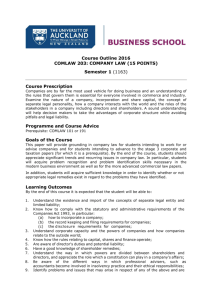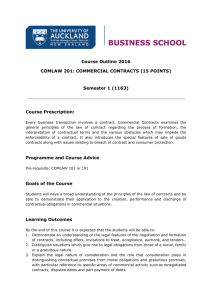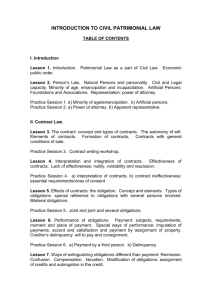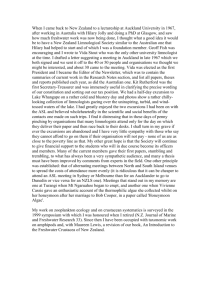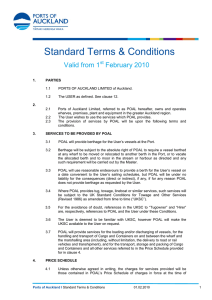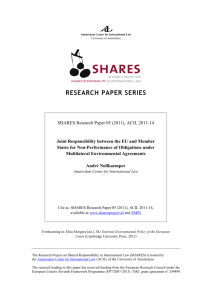LAW IN A BUSINESS ENVIRONMENT
advertisement
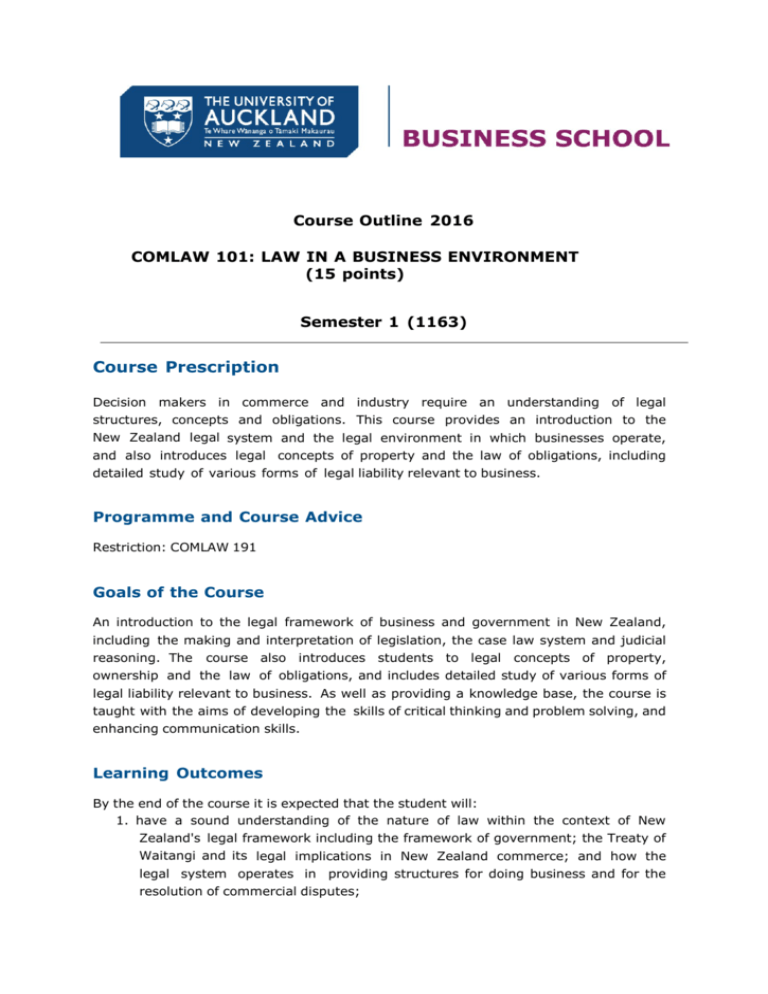
Course Outline 2016 COMLAW 101: LAW IN A BUSINESS ENVIRONMENT (15 points) Semester 1 (1163) Course Prescription Decision makers in commerce and industry require an understanding of legal structures, concepts and obligations. This course provides an introduction to the New Zealand legal system and the legal environment in which businesses operate, and also introduces legal concepts of property and the law of obligations, including detailed study of various forms of legal liability relevant to business. Programme and Course Advice Restriction: COMLAW 191 Goals of the Course An introduction to the legal framework of business and government in New Zealand, including the making and interpretation of legislation, the case law system and judicial reasoning. The course also introduces students to legal concepts of property, ownership and the law of obligations, and includes detailed study of various forms of legal liability relevant to business. As well as providing a knowledge base, the course is taught with the aims of developing the skills of critical thinking and problem solving, and enhancing communication skills. Learning Outcomes By the end of the course it is expected that the student will: 1. have a sound understanding of the nature of law within the context of New Zealand's legal framework including the framework of government; the Treaty of Waitangi and its legal implications in New Zealand commerce; and how the legal system operates in providing structures for doing business and for the resolution of commercial disputes; 2. be familiar with the various sources of law: how legislation is created and interpreted by the courts, and an understanding of the case law system and judicial reasoning within the hierarchy of the New Zealand courts; 3. understand some of the more significant statutes that directly affect businesses; 4. have a general understanding of the various different legal concepts of property and ownership, including trusts and intellectual property; 5. understand how the law protects privacy and commercial secrets, understand the creation of contracts, understand the basis of liability in negligence, and have an appreciation of fiduciary obligations, and when such obligations arise, have an understanding of the application of principles of liability in specific business contexts; and 6. have a sound framework in concepts and techniques for any further Commercial Law courses. Content Outline Week 1 Week 2 Week 3 Week 4 Week 5 Week 6 Week 7 Week 8 Week 9 Week 10 Week 11 Week 12 Week 13 Introduction; Our Legal Framework Our Legal Framework Legislation Case law Concepts of property and ownership Concepts of property and ownership, Trusts Privacy, Liability in contract Liability in contract, Consumer law Liability for negligence Liability for negligence, Fiduciary duties Intellectual Property Business structures and concepts Commerce Act Learning and teaching This course is taught in two hour lecture blocks four times per week. Some lecture time will be spent in Workshops where the law being studied is applied in a practical context through the use of case studies and the solving of legal problem scenarios. Students are expected to prepare for, attend and participate in a number of one-hour tutorials which focus on using legal problem-solving skills in a small group situation. There are pre-advised tutorial questions. The tutorial programme is a vital component of the learning. Tutorials are held weekly. Online testing is also provided to assist students with their learning. Regular office hours and/or drop in clinics on particular days are offered as further assistance in an individual and informal group setting, respectively. Teaching staff Philip Cook (Course Coordinator) Room 686, Level 6, Owen G Glen Building Telephone 373.7599 (ext 85253) Email: p.cook@auckland.ac.nz Other teaching staff: Leigh Miller Room 662, Level 6, Owen G Glen Building Telephone 373 7599 ext. 87118 Email l.miller@auckland.ac.nz Learning resources Watson (et al), Law for Business, Akoranga Press, Auckland, 2013. Eagles, Longdin (et al), Law in Business and Government in New Zealand, 4th edition, Palatine Press, Auckland, 2006. This book was previously used as a set text for this course and students may find it a useful supplement to the material in Watson (et al), Law for Business. Miller, Understanding Commercial Law, 8th edition, Lexis Nexis, Wellington, 2014. All three of these texts are available through the University library system. • Course Book: Comprehensive course materials sold at cost through the Business School Bookshop. • • Canvas: Various resources and information uploaded onto Canvas for online access. Exams: Copies of previous exam papers for this course are available on the University library website. Assessment Test: 30% of final mark and of one hour’s duration to assess learning outcomes 1 and 2. Tutorials and online assessment: 10% of final mark. During the semester, there will be weekly one-hour tutorials and/or online quizzes (though they may not occur in every week; and arrangements will differ in summer semester) to assess learning outcomes 1–6. Final examination: 60% of final mark and of two hour’s duration. Assessment of learning outcomes 1–6; more explicitly of learning outcomes 3-6, but implicitly also of foundation knowledge and skills in learning outcomes 1 and 2. The following table charts the assessment information: Learning outcome 1 Test (30%) √ Tutorials and online testing (10%) √ Final examination (60%) √ 2 √ √ √ 3 √ √ 4 √ √ 5 √ √ 6 √ √ Mark Allocations: Course Work: Test Tutorials Canvas Quizzes 30% 5% 5% Exam 60% Total 100% COMLAW101 | 7 Inclusive Learning Students are urged to discuss privately any impairment-related requirements face-toface and/or in written form with the course convenor/lecturer and/or tutor. Student Feedback Your feedback, both during the course and at its completion, is sought and encouraged. You can contact your class representatives to pass on your feedback to ensure your anonymity or you can contact the teaching or administrative staff direct. In addition, the Piazza on line platform provides a forum for feedback and questions on course material. Class representatives will be chosen from the class in the first week of lectures and their contact details posted on Canvas.
